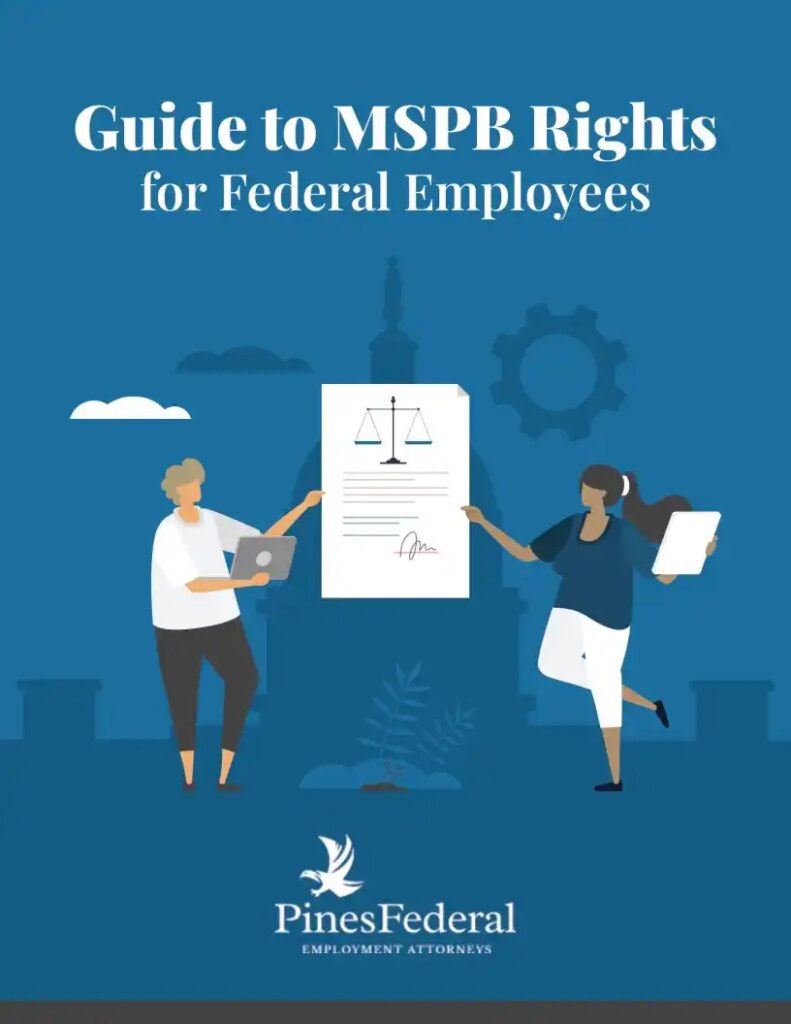
Being a federal employee can mean that you receive special benefits and have to follow intricate rules to make employment claims.
But before staking your claim to employee rights or federal compensation, you want to make sure you are truly a federal employee.
Are you performing work for a federal agency but wondering, Am I a federal employee? If so, this article can help answer your question.
If you believe you are a federal employee (or are unsure) and you want to understand your rights and obligations, Pines Federal can answer all your questions and help protect your interests. We are an award-winning federal employment legal team that focuses exclusively on federal employment matters.
Contact us online or call (800) 801-0598 today for assistance.

“I highly recommend Pines Federal to any federal employee who needs legal representation. I am so grateful that I had [them] on my side. They are professional, trustworthy and dedicated to each individual’s case. They have a wealth of experience combined with their knowledge of federal employee rights to provide the client with the best possible outcome.”
What Is a Federal Employee?
Simply put, a federal employee is someone who works for the executive, judicial, or legislative branch of the federal government and whose work does not qualify them as an independent contractor.
Federal Civilian Employee Examples
We will discuss what an independent contractor is below, but first, let’s review some examples of federal employees for each branch of government.
Executive Branch Employees
The executive branch enforces laws under the guidance of the President of the United States. This branch includes the president, the vice president, the president’s cabinet, and 15 executive departments.
If you are an employee of the White House or one of the following federal departments, you are likely a federal employee:
- The Department of Defense,
- The Department of Commerce,
- The Department of Education,
- The Department of Health and Human Services,
- The Department of Energy,
- The Department of Housing and Urban Development,
- The Department of Homeland Security,
- The Department of the Interior,
- The Department of Labor,
- The Department of Justice,
- The Department of State,
- The Department of the Treasury,
- The Department of Transportation, or
- The Department of Veterans Affairs.
Whether you are an employee in management, custodial affairs, administration, security, or maintenance for one of the above departments—you are a federal employee. And if you are not a federal employee who is on active military duty, you are defined as a federal civilian employee.
Judicial Branch Employees
The judicial branch includes the federal court system and organizations—like the Federal Judiciary Center—that support the U.S. courts. This is the branch that interprets our laws.
Under the federal court system are the following:
- The U.S. Supreme Court,
- The U.S. Courts of Appeals,
- The U.S. Bankruptcy Appellate Panels,
- The U.S. District Courts,
- The U.S. Bankruptcy Courts, and
- Article I Courts.
You don’t have to be a judge, a clerk, or an attorney to be a federal employee under the judicial branch. Any work you provide to the judicial branch can qualify you as a federal employee.
Legislative Branch Employees
The legislative branch makes our federal laws through Congress, which consists of the U.S. House of Representatives and the U.S. Senate.
The employees of Congress and employees of the following support agencies are federal employees of the legislative branch:
- The Government Accountability Office,
- The Capitol Police, and
- The Library of Congress.
If you are a senator, representative, congressional aide, or support staff for the U.S. Capitol, you likely have several rights as a federal employee.
Is a Contractor a Federal Employee?
The short answer is no. Generally, many federal employee rights do not apply to independent contractors of the federal government. And there are many federal agencies that outsource work to independent contractors. In fact, in 2022, the U.S. government committed almost $700 billion to contracts. So, with so many contracts covering work for federal agencies, how do you know if you are a federal employee or contractor?
If the federal agency you work for signs your checks and withholds federal taxes from your pay, you are likely a federal employee. You can also look at the factors below to determine your employment status.
When it comes to your work relationship with a federal agency, answering yes to some or all of the following questions could mean that you are an independent contractor:
- Do you have a high degree of control over your work?
- Does your work take a high level of skill and initiative?
- Does your work relationship lack permanence?
- Does your work give you an opportunity for profit or loss based on your managerial skills?
- Have you made investments in your work?
- Do you perform work that is not integral to the federal agency’s business?
Even if you are an independent contractor for a federal agency, your circumstances might make you an employee of a government contractor, and you might have employment rights under state law. We do not handle state employment cases, but if you think you might have rights under state law, we can refer you to a practitioner who can help.
Pines Federal Can Protect Your Federal Employment Rights
You may still be asking, Am I a federal employee? Or, if you know you are a federal employee, are you currently in a dispute with your employer? Our attorneys have solutions and answers for you. We have over 60 years of combined experience, and we are leaders in the federal employment community.
Please note that our firm focuses on full-time federal employees only. If you are a contract employee or contractor, we encourage you to consult another firm that might be able to help.
But if you are a federal contractor who has suffered discrimination or retaliation from a federal employee supervisor, we invite you to speak to us about your situation.
Whether you have questions about your federal employment status, your right to benefits, or your right to legal remedies after an employer violates your rights, we can help. We have won large settlements and awards for our clients, and we have received countless five-star client reviews.
We are top lawyers who focus exclusively on federal employment, so give us a call at (800) 801-0598 or contact us online when you have issues with your federal job.
[DOWNLOAD] MSPB Rights for Federal Employees
